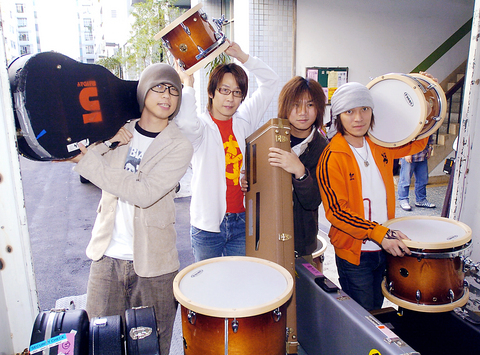If you notice an influx of teenage girls in the capital this weekend, you can thank Mayday (五月天), the punk rock pack-cum-pop idols that will be playing the Taipei Athletic tomorrow night.
A favorite of Taiwan's nascent rock scene in the mid to late-1990s, Mayday catapulted to fame following their Golden Melody nomination for Best Band in 2000. Though they lost the award that year, a contract they inked with Rock Records, the nation's largest label for rock music, gave them the marketing muscle they needed to start selling records on the same scale as perennially favorite pop stars like Lee Hom Wong (王力宏), Eason Chan (陳奕迅) and David Tao. They've since become one of Taiwan's only million-selling rock bands, behind Wu Bai and China Blue, and they've taken home their own Golden Melody awards for Best Band and Best Video and even had a Taipei City Honor award bestowed on them by Mayor Ma Ying-jeou (馬英九).

PHOTO: TAIPEI TIMES
But along with fame came a change in the style of the band's music. Songs that once had a harder edge to them softened, started fitting a more standard three-minute format and generally became more KTV-friendly. Their love ballad Chun-chiao and Chih-ming (春嬌與志明) was the No. 1 most-requested song in the nation's KTVs for over 50 weeks following their 2000 Golden Melody nod, according to their label.
Their lyrics now typically deal with love, where they once sang about teen angst and even gay rights -- a topic their music hasn't broached in recent years. Their more melodic pop sound has garnered them comparisons with the early Beatles -- one of Mayday's admitted idols. They even emulated the Fab Four's famous Apple Studios rooftop gig, playing a few songs atop EMI studios in downtown Taipei in December of 2003.
It was a far cry from their early gigs played in smoky Taipei pubs or in the fields of Spring Scream in the late 1990s, where they came up with bands like Sticky Rice (糯米團) and Luantan (亂彈). Some say the changes they've undergone over the past five years are tantamount to selling out, others dispute the charge. For their part, the band is now concerned with selling out in a much different meaning of the term.
In August of 2003, Mayday broke a Taiwan concert attendance record long held by Michael Jackson, surpassing the gloved-one's 40,000-ticket benchmark. Three months later, David Tao broke that record again by selling 50,000 tickets.
Reached by phone earlier this week, Mayday's publicity agent seemed confident the band would again get 40,000 fans into the house, but explained that it wouldn't be possible to get any more.
"We can't sell any more than 40,000 because that's the capacity of the Taipei Athletic Stadium," she said. "But I'm sure we'll sell out."
She suggested that anyone trying to get a ticket at the door arrive as early as possible. Alternatively, tickets are still being sold at the National Concert Hall (兩廳院), the only outlet which hasn't sold out. Nosebleed seats cost NT$500 and sitting front-row-center will set you back NT$1,500.
Performance notes:
What: Mayday concert
Where: The Taipei Athletic Stadium (
When: Tomorrow night, 7:30pm
Tickets: NT$500 to NT$1,500, at the door or at National Concert Hall (兩廳院)

Most heroes are remembered for the battles they fought. Taiwan’s Black Bat Squadron is remembered for flying into Chinese airspace 838 times between 1953 and 1967, and for the 148 men whose sacrifice bought the intelligence that kept Taiwan secure. Two-thirds of the squadron died carrying out missions most people wouldn’t learn about for another 40 years. The squadron lost 15 aircraft and 148 crew members over those 14 years, making it the deadliest unit in Taiwan’s military history by casualty rate. They flew at night, often at low altitudes, straight into some of the most heavily defended airspace in Asia.

Taiwan’s democracy is at risk. Be very alarmed. This is not a drill. The current constitutional crisis progressed slowly, then suddenly. Political tensions, partisan hostility and emotions are all running high right when cool heads and calm negotiation are most needed. Oxford defines brinkmanship as: “The art or practice of pursuing a dangerous policy to the limits of safety before stopping, especially in politics.” It says the term comes from a quote from a 1956 Cold War interview with then-American Secretary of State John Foster Dulles, when he said: ‘The ability to get to the verge without getting into the war is

Many people in Taiwan first learned about universal basic income (UBI) — the idea that the government should provide regular, no-strings-attached payments to each citizen — in 2019. While seeking the Democratic nomination for the 2020 US presidential election, Andrew Yang, a politician of Taiwanese descent, said that, if elected, he’d institute a UBI of US$1,000 per month to “get the economic boot off of people’s throats, allowing them to lift their heads up, breathe, and get excited for the future.” His campaign petered out, but the concept of UBI hasn’t gone away. Throughout the industrialized world, there are fears that

Like much in the world today, theater has experienced major disruptions over the six years since COVID-19. The pandemic, the war in Ukraine and social media have created a new normal of geopolitical and information uncertainty, and the performing arts are not immune to these effects. “Ten years ago people wanted to come to the theater to engage with important issues, but now the Internet allows them to engage with those issues powerfully and immediately,” said Faith Tan, programming director of the Esplanade in Singapore, speaking last week in Japan. “One reaction to unpredictability has been a renewed emphasis on